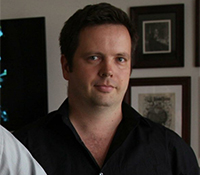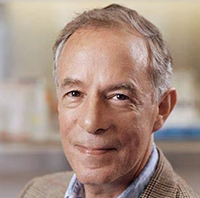Dear TCP Division Members,
 2021 is set to be an exciting year for our division. As TCP’s chair, Dr. Felix Kim has empowered our division by establishing a collaborative and transparent Executive Committee and recruiting numerous enthusiastic new members to our key subcommittees.
2021 is set to be an exciting year for our division. As TCP’s chair, Dr. Felix Kim has empowered our division by establishing a collaborative and transparent Executive Committee and recruiting numerous enthusiastic new members to our key subcommittees.
Working together, we’re improving the way the division communicates with its membership and setting up some outstanding programming (both for the annual meeting and virtual sessions). I’m particularly excited about the Ray Fuller lecture, which has been sponsored by TCP since 2018 and promises to be a highlight of our divisional programming in years to come.
Sincerely,
Ross Corriden, PhD
Chair-Elect, Translational & Clinical Pharmacology Division of ASPET
2020 TCP Awards/Spotlights - Interview with Dr. Michael Brownstein
 The Division for Translational and Clinical Pharmacology is proud to host the 18th Ray Fuller Lecture at EB2021. This year, we are honored to have Dr. Michael Brownstein as our speaker.
The Division for Translational and Clinical Pharmacology is proud to host the 18th Ray Fuller Lecture at EB2021. This year, we are honored to have Dr. Michael Brownstein as our speaker.
After earning MD and PhD degrees at the University of Chicago, Dr. Brownstein joined the National Institute of Mental Health (NIMH) as a PRAT Research Associate, eventually becoming chief of the Laboratory of Genetics of the NIMH and the National Human Genome Research Institute. During this time, Dr. Brownstein made extensive contributions to the vasopressin receptor field, among other accomplishments. He subsequently went on to direct the functional genomics program at the J. Craig Center Institute in Rockville, MD, followed by work at several companies, including Azevan Pharmaceuticals, where he has focused on development of vasopressin 1a receptor antagonists for the treatment of central nervous system disorders.
Much of your work has focused on vasopressin receptors, including your ongoing efforts at Azevan Pharmaceuticals. What are your thoughts on therapeutic opportunities for vasopressin receptor-targeted compounds?
MB: As I will say in my talk, in Azevan we have focused to date on treating irritability, anger, and aggressive behavior in patients with Huntington's disease. If we are successful, it should be clear that patients with other neurodegenerative diseases who are aggressive - those with Alzheimer's and Parkinson's disease - may also benefit from vasopressin V1a receptor antagonists. So may people with PTSD, Intermittent Explosive Disorder, and autism. I'm excited about this possibility.
I'll also mention another clinical target in my talk, traumatic brain injury. It would be wonderful to be able to prevent brain damage following injuries instead of trying to treat deficits months later.
There are other potential indications for vasopressin V1a receptor antagonists that we haven't worked on. An example is Raynaud's disease. It's clear from the literature that vasopressin plays a significant role in causing peripheral vasoconstriction in people who suffer from this problem.
As the Chief Medical Officer for Adaptive Phage Therapeutics, what role do you see phage therapies taking in the effort to combat multi-drug resistant pathogenic bacteria?
MB: I'm enthusiastic about phage therapy. It has been estimated that there are 1031 phages on Earth - about a trillion phages for every grain of sand. These viruses have been doing battle with bacteria for a very long time and have developed many ways to combat them. We can exploit this viral diversity by making phage banks and adding to them as resistance to the phages we are using emerges. It is likely that resistance to new antibiotics will emerge before their patents expire. To make matters worse, many antibiotics are rather toxic. Well-chosen phages are not.
In 2015, you published the novel “Walrus,” the fictional memoirs of a scientist named Walter Russel. Where did you draw inspiration for these stories?
MB: The book begins with a description of Walter Russell's grandparents and parents. Some of the stories are based on what my dad told me about growing up in a small town in Northern Indiana and some, but certainly not all, of the stories about the Walrus himself are based on things that I have observed in my own career. My mentor, "Julie" Axelrod, was very different from the Walrus' mentor, and I have tried to be as Julie-like as possible in my career. The Walrus resembles his mentor. In spite of this, I came to like the Walrus, and I think that he began to find his way in life by the end of the novel. (The book is available at Amazon but if you'd like a free pdf version, send me an email: mjbrownstein@gmail.com)
What experiences outside of the lab helped to drive your development as a researcher?
MB: I have always had hobbies (building furniture, repairing guitars, writing stories) and collections (minerals, pocket watches, Japanese and Indo-Persian swords, twentieth century art). Each of these has been an opportunity to study something different. Novelty and creativity, no matter where you find them, are inspiring and open your mind to new ways of thinking.
Your research has spanned many different topics and therapeutic areas - what advice would you have for early career scientists who are apprehensive about exploring new fields?
MB: "It's hard to be brave," said Piglet, sniffling slightly, "when you're only a Very Small Animal." I understand this.
I finished my PhD thesis work in the middle of an academic year, and I spent the rest of that year in London working in David Brown's lab. I had done biochemistry. David was an electrophysiologist. Working for him gave me a chance to learn new methods and a new approach to problems. In addition, the intellectual environment was different from the one I had been used to. There was an emphasis on designing perfect experiments before you embarked on lab work. This approach to problems has been especially useful to me in biotechs, where it's important to hit research targets as quickly and cheaply as possible.
ASPET Meeting at EB 2021 TCP Session Highlight: “Experimental Approaches for the Treatment of Infectious Disease”
Be sure to attend the TCP Division sponsored session on “Experimental Approaches for the Treatment of Infectious Diseases” on Tuesday April 27 2021 from 2-3:30pm (ET). This session will be hosted by chairs Drs. Ross Corriden (Merck) and Ericka Anderson (UC San Diego) and features a panel of experts who will discuss cutting-edge techniques and their ongoing work that addresses the antibiotic resistance crisis. Amongst the 2.8 million people in the US that are infected with antibiotic-resistant pathogens, 35,000 die as a result of such infections each year. Particularly at risk are patients already more vulnerable to illness from viral lung infections such as COVID-19; in fact, the CDC estimates that 29%-55% of the deaths recorded during the 2009 H1N1 influenza pandemic were caused by secondary bacterial pneumonia. Many major pharmaceutical companies have abandoned antibiotic R&D after judging it to be unprofitable, creating an innovation gap. Furthermore, because of frequent use of antibiotics for self-resolving issues, physician reliance on unnecessarily broad-spectrum regimes, widespread use of antibiotics in agricultural feed for growth promotion, and pure Darwinian evolution of bacteria, we face a dilemma where new anti-infective approaches are needed. This symposium highlights translational research efforts aimed at resolving this unmet medical need. Since initial submission for EB2020, this session has been adjusted with a renewed focus on respiratory tract infections.
This session will feature work from:
Lauren Bakaletz (Ohio State University College of Medicine; Scioto Biosciences): The talk entitled “Targeting the Biofilm Matrix for Disruption Results in Newly Released (NRel) Bacteria with Markedly Increased Sensitivity to Traditional Antibiotics that are Otherwise ineffective Against Biofilms” will dissect the potential utility of antibody-mediated release of bacteria from biofilm residence.
Liangfang Zhang (University of California, San Diego): The talk entitled “Biomimetic Nanoparticles for the Treatment of Infectious Diseases” will highlight the biological functionalization of polymeric nanoparticles with a layer of membrane coating derived from natural cells for the treatment of bacterial and viral infections.
Lynette Cegelski (Stanford University): Dr. Cegelski will be presenting on “Vancomycin Conjugates Yield Extraordinary New Activities Against Gram-positive and Gram-negative Bacteria.”
David Gonzalez (UC San Diego, School of Medicine and Pharmacy): The talk entitled “Mortality Risk Profiling of Staphylococcus aureus Bacteremia by Multi-omic Serum Analysis Reveals Early Predictive and Pathogenic Signatures” will highlight multi-omic analysis of serum from patients with Staphylococcus aureus bacteremia performed by Dr. Gonzalez’s team which reveals predictive value to determine disease mortality and guide treatment decisions.